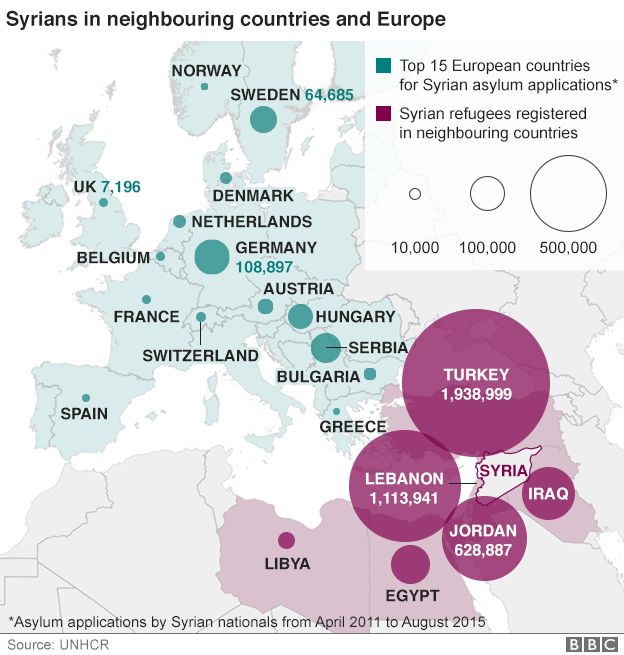Euro migrant crisis explained in graphics
Vast numbers of migrants have made their way across the Mediterranean to Europe in 2015, sparking a crisis as countries struggle to cope with the influx, and creating division in the EU over how best to deal with resettling people.
How many people are coming?
Almost 600,000 migrants are estimated to have arrived by sea so far this year, according to the International Organization for Migration (IOM), but exact numbers are unclear as some may have passed through borders undetected.
One way to measure where migrants have ended up is through asylum applications. Although not all of those arriving claim asylum, over half a million have done so, according to the EU statistics agency, Eurostat.
Germany continues to be the most popular destination for migrants arriving in Europe. It has received the highest number of new asylum applications, with almost 222,000 by the end of August. Hungary has moved into second place, as more migrants have tried to make the journey overland through Greece and the Western Balkans. It had 96,350 applications by the end of July.
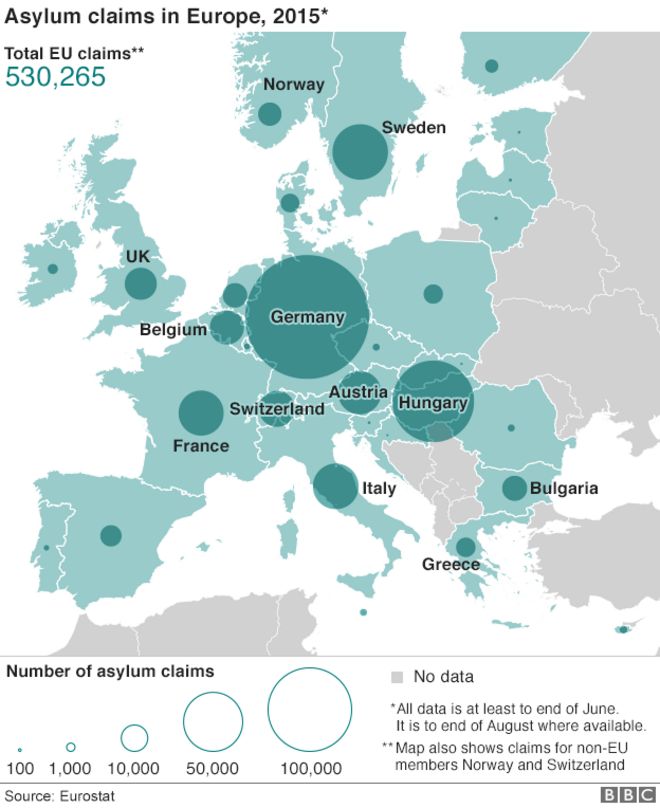
Although Germany has had the most asylum applications in 2015, the surge of people arriving in Hungary meant it had the highest in proportion to its population. Almost 665 refugees per 100,000 of Hungary's local population claimed asylum in the first half of 2015. The figure for Germany was 190 and for the UK it was 23 applications for every 100,000 residents.
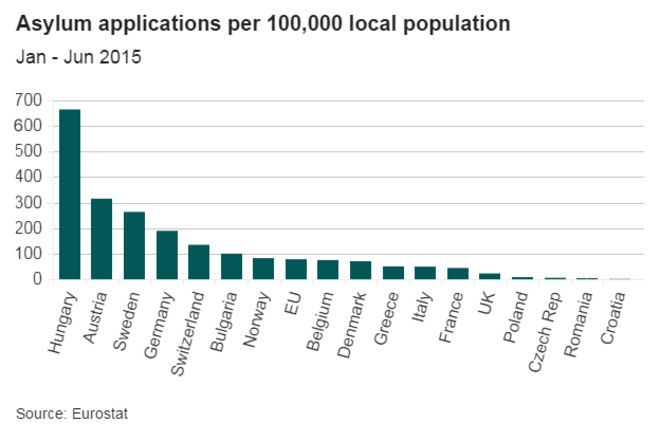
Where do the migrants come from?
The conflict in Syria continues to be by far the biggest driver of the migration. But the ongoing violence in Afghanistan, abuses in Eritrea, as well as poverty in Kosovo are also leading people to look for new lives elsewhere.
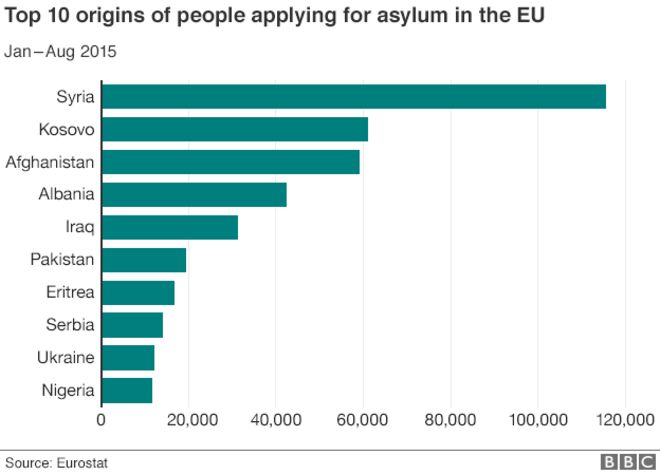
Resettlement plan
Tensions in the EU have been rising because of the disproportionate burden faced by some countries, particularly Greece, Italy and Hungary where migrants have been arriving by boat and overland.
At an emergency meeting in Brussels, EU ministers voted by a majority to relocate 120,000 refugees EU-wide, but for now the plan will only apply to 66,000 who are in Italy and Greece. The other 54,000 were to be moved from Hungary, but now this number will be held "in reserve", until the governments decide where they should go.
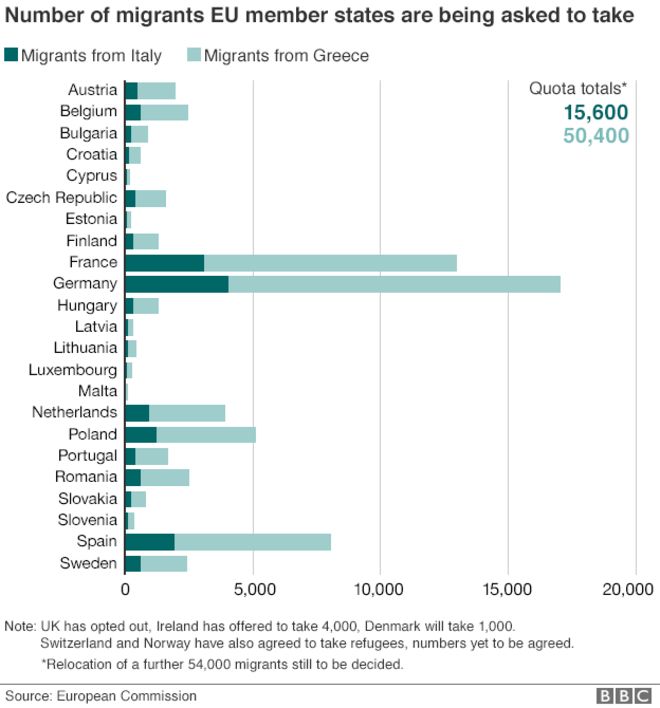
The UK has opted out of any plans for a quota system and, according to Home Office figures, has accepted 216 Syrian refugees under the Vulnerable Persons Relocation scheme since it began in January 2014. Prime Minister David Cameron has said the UK will accept up to 20,000 refugees from Syria over the next five years.
Granting asylum
Although huge numbers have been applying for asylum, the number of people being given asylum is far lower.
In 2014, EU countries offered asylum to 184,665 refugees. In the same year, more than 570,000 migrants applied for asylum - although applying for asylum can be a lengthy procedure so many of those given refugee status may have applied in previous years.
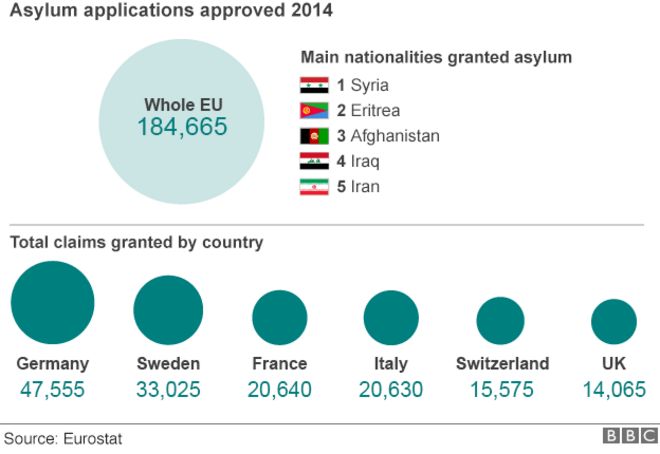
There were more than 25,000 asylum applications in the UK in the 12 months up to June 2015. Most applications are typically rejected and in 2014, more than 60% of initial decisions on asylum applications were refusals.
In the same period, 6,788 asylum seekers and their dependents were removed or departed voluntarily from the UK.
How do migrants get to Europe?
The International Organization for Migration (IOM) estimates that more than 593,000 migrants were detected at the EU's borders between January and October 2015, compared with 280,000 detections for the whole of 2014. The figures do not include those who got in undetected.
The EU's external border force, Frontex, monitors the different routes migrants use and numbers arriving at Europe's borders and put the figure crossing into Europe this year at more than 710,000.
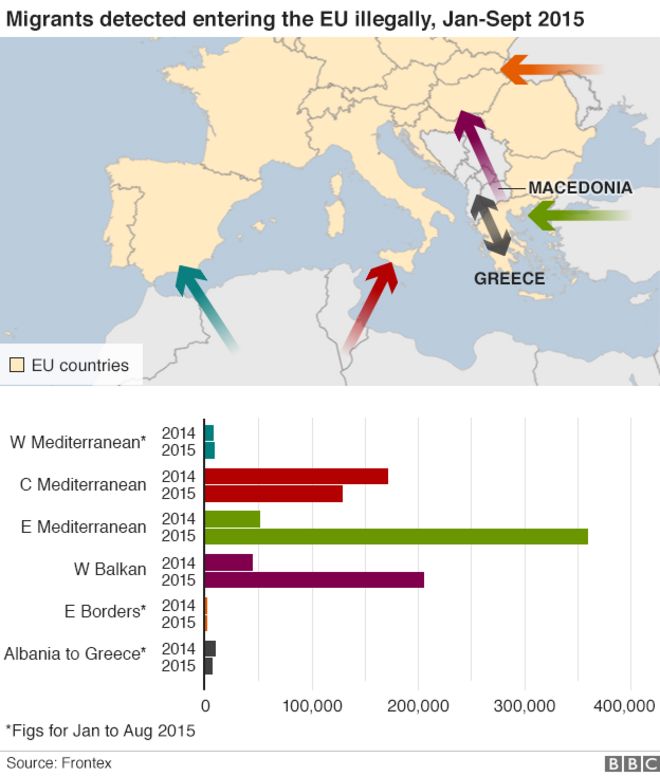 Image caption
Image caption
The eastern Mediterranean route has overtaken the central route as the most commonly used this year - with Syrians forming by far the largest migrant group. Most of those heading for Greece take the relatively short voyage from Turkey to the islands of Kos, Chios, Lesvos and Samos - often in flimsy rubber dinghies or small wooden boats.
How many migrants die?
The voyage from Libya to Italy is longer and more hazardous. According to the IOM, more than 2,800 migrants are reported to have died trying to make the crossing this year - altogether, 3,092 people have died in the Mediterranean in 2015.
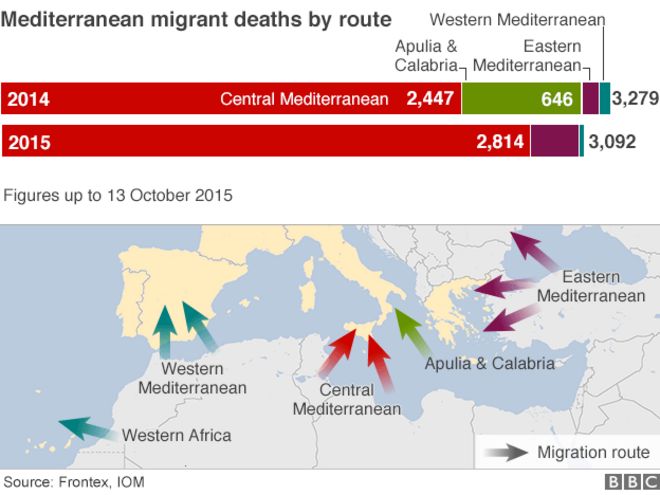
The summer months are usually when most fatalities occur as it is the busiest time for migrants attempting to reach Europe.
But so far this year the deadliest month for migrants was April, which saw a boat carrying about 800 migrants capsize in the sea off Libya. Overcrowding is thought to have been one of the reasons for the disaster.
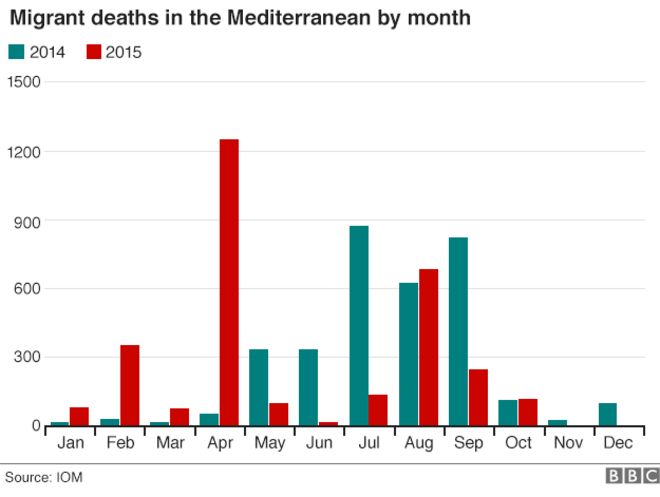
Impact of the Syrian crisis
Asylum applications from Syrians in Europe have surged in 2015, fuelled by the country's vicious civil war which began more than four years ago and shows no sign of ending. The vast majority of refugees have fled to neighbouring countries such as Turkey, Lebanon and Jordan, and the number of Syrians there far outweighs those who have made the difficult journey to Europe.
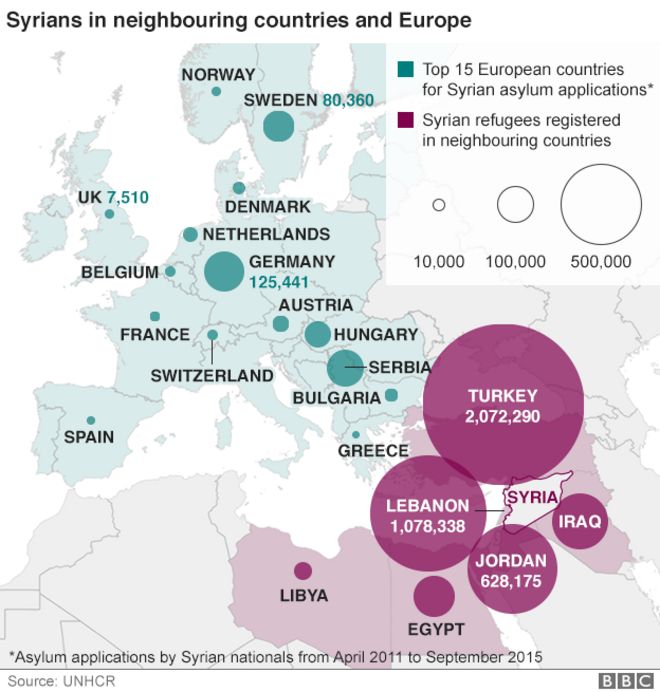
Migrants redistributed within Germany
Germany is currently the preferred destination for tens of thousands of migrants in central Europe. More than 800,000 people are expected to claim asylum there this year, four times the figure for 2014.
Germany has a quota system which redistributes asylum seekers around its federal states based on their tax income and existing population density.
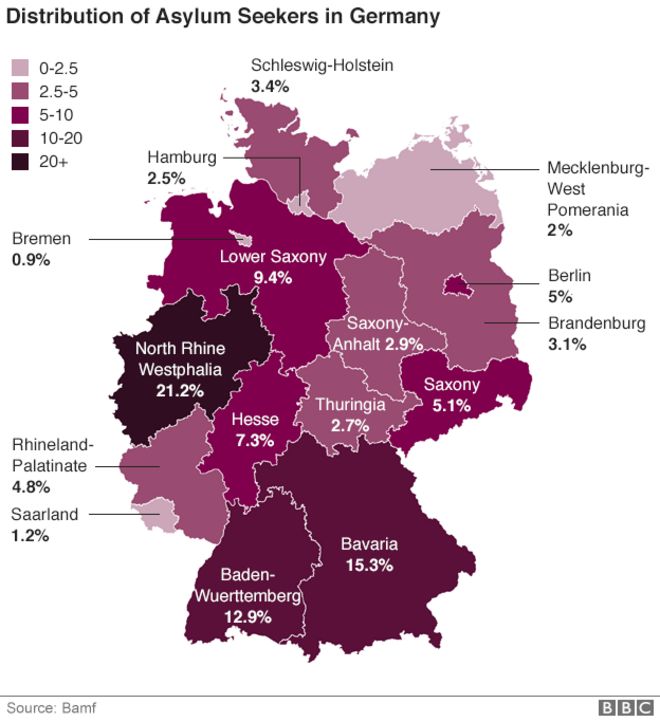 A note on terminology: The BBC uses the term migrant to refer to all people on the move who have yet to complete the legal process of claiming asylum. This group includes people fleeing war-torn countries such as Syria, who are likely to be granted refugee status, as well as people who are seeking jobs and better lives, who governments are likely to rule are economic migrants.
A note on terminology: The BBC uses the term migrant to refer to all people on the move who have yet to complete the legal process of claiming asylum. This group includes people fleeing war-torn countries such as Syria, who are likely to be granted refugee status, as well as people who are seeking jobs and better lives, who governments are likely to rule are economic migrants.
http://www.bbc.com/news/world-europe-34131911
Vast numbers of migrants have made their way across the Mediterranean to Europe in 2015, sparking a crisis as countries struggle to cope with the influx, and creating division in the EU over how best to deal with resettling people.
How many people are coming?
Almost 600,000 migrants are estimated to have arrived by sea so far this year, according to the International Organization for Migration (IOM), but exact numbers are unclear as some may have passed through borders undetected.
One way to measure where migrants have ended up is through asylum applications. Although not all of those arriving claim asylum, over half a million have done so, according to the EU statistics agency, Eurostat.
Germany continues to be the most popular destination for migrants arriving in Europe. It has received the highest number of new asylum applications, with almost 222,000 by the end of August. Hungary has moved into second place, as more migrants have tried to make the journey overland through Greece and the Western Balkans. It had 96,350 applications by the end of July.

Although Germany has had the most asylum applications in 2015, the surge of people arriving in Hungary meant it had the highest in proportion to its population. Almost 665 refugees per 100,000 of Hungary's local population claimed asylum in the first half of 2015. The figure for Germany was 190 and for the UK it was 23 applications for every 100,000 residents.

Where do the migrants come from?
The conflict in Syria continues to be by far the biggest driver of the migration. But the ongoing violence in Afghanistan, abuses in Eritrea, as well as poverty in Kosovo are also leading people to look for new lives elsewhere.

Resettlement plan
Tensions in the EU have been rising because of the disproportionate burden faced by some countries, particularly Greece, Italy and Hungary where migrants have been arriving by boat and overland.
At an emergency meeting in Brussels, EU ministers voted by a majority to relocate 120,000 refugees EU-wide, but for now the plan will only apply to 66,000 who are in Italy and Greece. The other 54,000 were to be moved from Hungary, but now this number will be held "in reserve", until the governments decide where they should go.

The UK has opted out of any plans for a quota system and, according to Home Office figures, has accepted 216 Syrian refugees under the Vulnerable Persons Relocation scheme since it began in January 2014. Prime Minister David Cameron has said the UK will accept up to 20,000 refugees from Syria over the next five years.
Granting asylum
Although huge numbers have been applying for asylum, the number of people being given asylum is far lower.
In 2014, EU countries offered asylum to 184,665 refugees. In the same year, more than 570,000 migrants applied for asylum - although applying for asylum can be a lengthy procedure so many of those given refugee status may have applied in previous years.

There were more than 25,000 asylum applications in the UK in the 12 months up to June 2015. Most applications are typically rejected and in 2014, more than 60% of initial decisions on asylum applications were refusals.
In the same period, 6,788 asylum seekers and their dependents were removed or departed voluntarily from the UK.
How do migrants get to Europe?
The International Organization for Migration (IOM) estimates that more than 593,000 migrants were detected at the EU's borders between January and October 2015, compared with 280,000 detections for the whole of 2014. The figures do not include those who got in undetected.
The EU's external border force, Frontex, monitors the different routes migrants use and numbers arriving at Europe's borders and put the figure crossing into Europe this year at more than 710,000.

The eastern Mediterranean route has overtaken the central route as the most commonly used this year - with Syrians forming by far the largest migrant group. Most of those heading for Greece take the relatively short voyage from Turkey to the islands of Kos, Chios, Lesvos and Samos - often in flimsy rubber dinghies or small wooden boats.
How many migrants die?
The voyage from Libya to Italy is longer and more hazardous. According to the IOM, more than 2,800 migrants are reported to have died trying to make the crossing this year - altogether, 3,092 people have died in the Mediterranean in 2015.

The summer months are usually when most fatalities occur as it is the busiest time for migrants attempting to reach Europe.
But so far this year the deadliest month for migrants was April, which saw a boat carrying about 800 migrants capsize in the sea off Libya. Overcrowding is thought to have been one of the reasons for the disaster.

Impact of the Syrian crisis
Asylum applications from Syrians in Europe have surged in 2015, fuelled by the country's vicious civil war which began more than four years ago and shows no sign of ending. The vast majority of refugees have fled to neighbouring countries such as Turkey, Lebanon and Jordan, and the number of Syrians there far outweighs those who have made the difficult journey to Europe.

Migrants redistributed within Germany
Germany is currently the preferred destination for tens of thousands of migrants in central Europe. More than 800,000 people are expected to claim asylum there this year, four times the figure for 2014.
Germany has a quota system which redistributes asylum seekers around its federal states based on their tax income and existing population density.

http://www.bbc.com/news/world-europe-34131911
Last edited:

